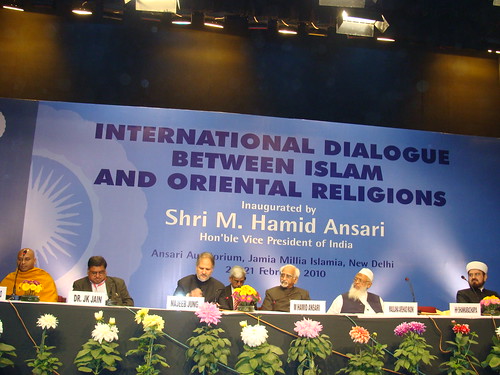By Asghar Ali Engineer
Today’s world is highly diverse. There is not a single country in the world which is homogenous and without diversity. Though in the past too diversity existed but colonization, scientific progress and faster means of transpiration has increased diversity in the world and globalization has further added to its intensity. In the past generally people moved for better prospects within the country, today people seek jobs, even education, in far off countries or even across continents.
Also, it is Allah’s will to create diversity among His creation. ALLAH SAYS IN Qur’an, “And if Allah had pleased He would have made you a single people, but that He might try you in what He gave you. So vie one with another in virtuous deeds.” (5:48) Thus diversity is Allah’s will and it is trial for us if we can live in peace and harmony with each other despite this diversity. Also, Allah wants us not to assert our superiority but to vie one with another in good deeds.
Also, if there is diversity there is likely to be misunderstandings and misconception about each other which often lead to conflict and breach of peace. This applies to both: interfaith and intrafaith communities. Interfaith conflict is also widespread like between Shi’ahs and Sunnis or Bohra or non-Bohra Muslims or between Barelvis and Deobandis. The only way to remove these misconceptions is to have dialogue with each other.
Thus three Ds become quite important: democracy, diversity and dialogue. Democracy and diversity is complimentary to each other though many people think homogeneity is strength, it is not. Homogeneity can result in dictatorship whereas diversity becomes life-line for democracy. Experience shows that greater diversity results in stronger democracy.

International Dialogue between Islam and Oriental Religions was organized in New Delhi in Feb. 2010 [TCN Photo]
But diversity also poses a challenge and this challenge has to be met through proper understanding of each other through dialogue. Dialogue, it should be noted, is not a modern or contemporary concept including inter-religious dialogue. In medieval ages Sufis and yogis often used to have dialogue in India. Also, Sufis on one hand, and, Christian mystics and Jewish saints on the other, had mutual dialogue. Some of them spent years understanding others religious tradition. Dara Shikoh or Mazhar Jan-i-Janan, for example, had thorough knowledge of Hindu traditions. Dara Shikoh even translated Upanishad from Sanskrit into Persian and called it Sirr-e-Akbar (The Greatest Mystery). I have seen its manuscript in Darul Musannifin, Azamgarh. He also wrote a book called Majma’ul Bahrayn (Co-mingling of Two Oceans). It is a great book of dialogue between Hinduism and Islam.
However, there are some rules to be observed if dialogue has to succeed and produce required result. The very first requirement is that none participating in the dialogue should have attitude of superiority over the other. It goes against the very spirit of dialogue. Secondly, dialogue should be on certain concrete issues like women’s rights or war or non-violence and so on. Today there is a lot of misunderstanding about these issues. Most of the non-Muslims, especially Westerners think that Islam gives no rights to women and subjugates them thanks to certain practices among Muslims like hijab or polygamy or honour-killing and so on.
Similarly, there is widespread misunderstanding about the concept of jihad thanks to certain fatwas or statements of Usama bin Laden justifying his attack on New York Towers as jihad. In fact there is a great misconception among Muslims and Muslim Ulama about these issues like polygamy and Jihad. There is great need for dialogue with them too. And much more need to have dialogue with non-Muslims.
The dialogue process should include religious functionaries, scholars who have in-depth knowledge of the issues, journalists (who write and spread misconceptions) and lay people as well as these people are often victims of misconceptions. Secondly one should have humility to learn rather than argue on the basis of ignorance rather than knowledge. But participants must have right to raise questions to remove doubts.
Thirdly, one must be firmly rooted in one’s own faith tradition and should be able to explain the reasons for certain practice or rationale of the teaching. Any doubt or ignorance may harm the spirit of the dialogue. Also one should be able to remove all the doubts raised during discussion through one’s own thorough knowledge and conviction and clarity.
Fourthly, one should have tremendous patience and capacity to listen and understand others situation and try to remove doubts express and not try to silence the other through debating skill or try to use polemics. It will destroy the very idea of having dialogue. There is fundamental difference between debate and dialogue.
Also while being firmly rooted in one’s own faith tradition one also has to accept the other with his/her otherness without being critical of otherness. Dialogue is to promote understanding and not to reject other’s faith or finding fault in others faith. Dialogue should never be directed to convert the other but only to understand the other. Both or the multiple partners in dialogue should throw light on the concerned issue in the light of one’s own faith tradition and handle the question with tact and delicacy they deserve.
Dialogue so conducted can really work wonders and promote real understanding about one’s own faith while understanding others faith. I have been a part of dialogue process for more than 40 years and can say with confidence that dialogue plays very important role in a diverse society. Knowledge, conviction and clarity and appreciation for others points of view are very useful tools for dialogue.

